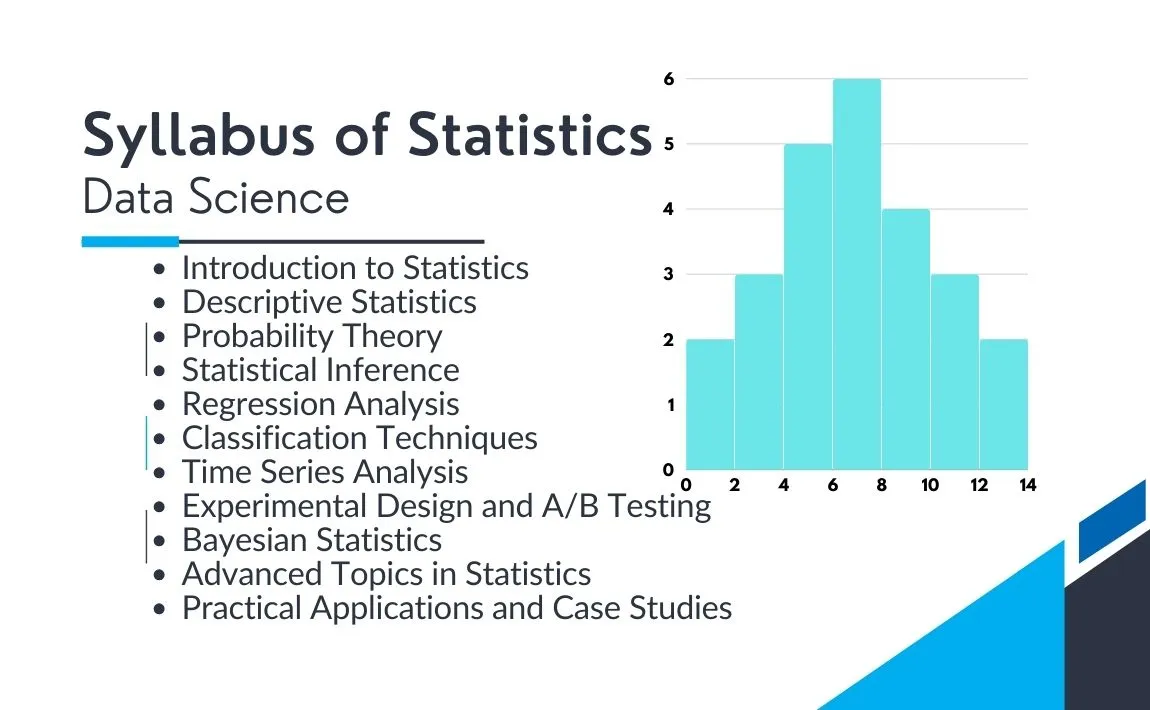Designing a comprehensive syllabus for statistics in data science involves covering foundational concepts, statistical methods, and their applications in data analysis and interpretation. Here’s a structured syllabus:
1. Introduction to Statistics:
- Overview of statistics and its importance in data science.
- Descriptive vs. inferential statistics.
- Basic terminologies: population, sample, variable, data types.
2. Descriptive Statistics:
- Measures of central tendency: mean, median, mode.
- Measures of dispersion: range, variance, standard deviation.
- Data visualization techniques: histograms, box plots, scatter plots.
3. Probability Theory:
- Fundamentals of probability: events, sample space, probability axioms.
- Conditional probability and independence.
- Probability distributions: discrete (binomial, Poisson) and continuous (normal, exponential).
4. Statistical Inference:
- Estimation theory: point estimation, interval estimation.
- Hypothesis testing: null and alternative hypotheses, p-values, type I and type II errors.
- Confidence intervals and significance testing.
5. Regression Analysis:
- Simple linear regression: modeling relationships between two variables.
- Multiple linear regression: extension to multiple predictor variables.
- Assessing regression model fit: R-squared, adjusted R-squared.
6. Classification Techniques:
- Logistic regression: modeling binary outcomes.
- Decision trees: tree-based classification and regression.
- Ensemble methods: random forests, gradient boosting.
7. Time Series Analysis:
- Introduction to time series data.
- Time series decomposition: trend, seasonality, and noise.
- Forecasting techniques: moving averages, exponential smoothing, ARIMA models.
8. Experimental Design and A/B Testing:
- Principles of experimental design.
- A/B testing methodology: hypothesis formulation, randomization, sample size determination.
- Analyzing A/B test results: statistical significance and practical significance.
9. Bayesian Statistics:
- Bayesian inference: prior, likelihood, posterior.
- Bayesian estimation and hypothesis testing.
- Bayesian modeling and Markov Chain Monte Carlo (MCMC) methods.
10. Advanced Topics in Statistics:
- Dimensionality reduction techniques: PCA (Principal Component Analysis), LDA (Linear Discriminant Analysis).
- Clustering algorithms: K-means, hierarchical clustering.
- Non-parametric methods: kernel density estimation, bootstrap resampling.
11. Practical Applications and Case Studies:
- Real-world data analysis projects demonstrating the application of statistical methods in data science.
- Hands-on exercises using statistical software and programming languages like Python, R, or MATLAB.
This syllabus provides a structured approach to learning statistics for data science, covering both theoretical foundations and practical applications essential for analyzing and interpreting data effectively.
